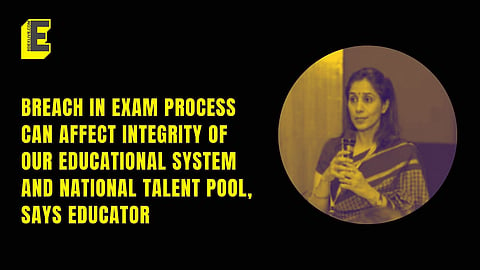Breach in exam process can affect integrity of educational system and national talent pool, says educator
Tell us about what has been happening in recent times...
In recent times, India's prestigious entrance examinations for higher education, such as Joint Entrance Examination (JEE), National Eligibility cum Entrance Test (NEET), Common Admission Test (CAT), and Graduate Aptitude Test in Engineering (GATE), have faced increasing cybersecurity challenges.
As these exams transition towards computer-based testing and online modes, the need to fortify our exam-conducting bodies against sophisticated cyber threats has become paramount.
What is the importance of these exams?
These entrance exams are critical gateways to India's top educational institutions, determining the futures of millions of students annually. Any breach or compromise in the exam process can have far-reaching consequences, affecting not only individual aspirants but also the integrity of our educational system and national talent pool.
What makes Indian entrance exams vulnerable to cyber attacks?
Several factors make Indian entrance exams vulnerable to cyber-attacks:
1. Large-scale operations
2. Technological transition
3. High-stakes nature
4. Diverse geographical spread
How can we strengthen our defences?
To counter these threats, exam-conducting bodies like the National Testing Agency (NTA), Indian Institutes of Management (IIMs), and GATE organising institutes have adopted a multi-faceted approach, such as :
1. Robust Cybersecurity Infrastructure
2. Secure Exam Delivery
3. AI-Powered Monitoring
4. Data Protection
5. Staff Training and Awareness
6. Collaboration with Cybersecurity Experts
7. Legal and Regulatory Compliance
8. Incident Response Planning
9. Blockchain for Credentialing
10. Public-Private Partnerships
How can concerns that have emerged in recent times be addressed?
Given the recent incidents of NEET (National Eligibility cum Entrance Test) and NET (National Eligibility Test) exam paper leaks, it's crucial to further implement stronger measures to safeguard the entrance examination process in India. This incident has marked the It is very important to address these specific concerns by introducing:
1. Digital Question Papers:
• Implement a system where question papers are digitally transmitted to exam centres just before the exam starts.
• Use encrypted channels and time-locked digital vaults that can only be accessed at the designated time.
2. Decentralised Question Setting:
• Adopt a modular approach where different sections of the question paper are set by separate teams.
• Compile the full paper only at the last stage to minimize the risk of a complete paper leak.
3. Enhanced Physical Security:
• Implement strict protocols for handling physical question papers, including tamper-evident packaging.
• Use CCTV surveillance in areas where question papers are stored or handled.
What will implementing this require?
Implementing these measures would require significant investment and coordination among various stakeholders, including the National Testing Agency, educational institutions, and law enforcement agencies.
However, given the critical nature of these entrance exams in shaping the future of millions of students, such efforts are essential to maintain the integrity and fairness of the examination process.
Your concluding thoughts...
Protecting the integrity of India's entrance examinations is crucial for maintaining trust in our educational system and ensuring fair opportunities for all aspirants. By implementing these measures and fostering a culture of cybersecurity awareness, we can significantly enhance our resilience against new-age threats.
However, this is an ongoing process that requires constant vigilance, adaptation, and investment in both technology and human resources.
Only through such concerted efforts can we safeguard the future of millions of Indian students and the nation's intellectual capital.



